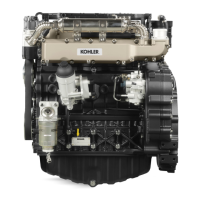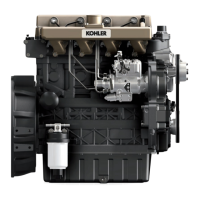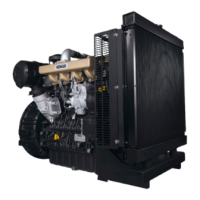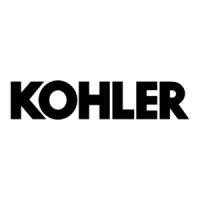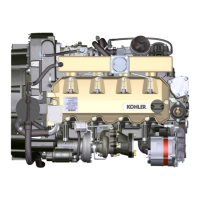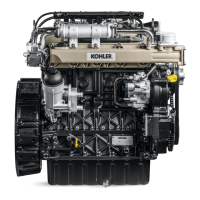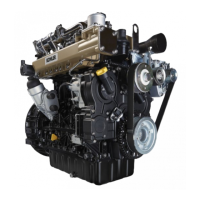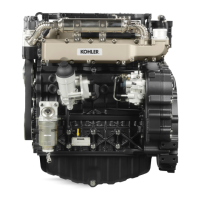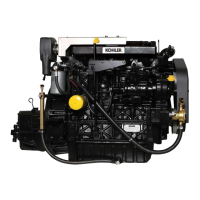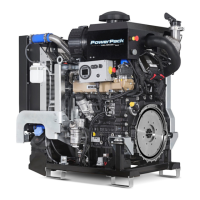Do you have a question about the Kohler KDI Series and is the answer not in the manual?
Provides instructions for proper use and maintenance, reflecting the state of the art.
Details on locating and understanding the engine identification name plate.
Explanation of the information provided on the name plate for EPA regulations.
Illustrates and identifies key internal engine components and operating references.
Illustrates and identifies external engine components in base configuration.
Presents detailed specifications and operating data for KDI 1903 TCR and KDI 2504 TCR engines.
Provides dimensional drawings and measurements for KDI 1903 TCR and KDI 2504 TCR engines.
Shows power, torque, and specific consumption curves for engine models at different speeds.
Important information on oil types, SAE classification, and international lubricant specifications.
Guidelines for fuel types, including low-temperature and biodiesel usage, and fuel compatibility.
Technical specifications for coolant mixtures and recommendations.
Details preventive maintenance intervals for cleaning, checking, and replacement of engine components.
Information on fuel system components and limits on pollutant presence in fuel.
Description of the fuel supply and return circuits, including key components.
Details about the high-pressure injection pump, its components, and handling precautions.
Information on the electronic injector, its function, calibration, and handling.
Description of the Common Rail system, pressure sensor, and safety valve.
Details on the fuel filter's location, components, and cartridge characteristics.
Instructions for installing an optional electric fuel pump and its specifications.
Highlights the importance of using protective caps for fuel injection circuit components.
Diagrams and descriptions of the engine's lubrication circuit and its components.
Details on the oil pump rotors, body, and assembly with reference to key components.
Description of the oil filter and oil cooler assembly, including cartridge characteristics.
Diagrams illustrating the coolant circuit and identifying its main components.
Details on the coolant pump, including its control pulley and intake fitting.
Information about the optional radiator with intercooler and its associated components.
Details on the thermostatic valve, its starting opening temperature, and related components.
Description of the EGR Cooler device, which cools exhaust gas for emission control.
Overview of the intake and exhaust systems, including turbocharger and catalyst.
Explanation of the turbocharger's operation, control, and important operating rules.
Description of the catalyst's function in filtering exhaust gas and its composition.
Illustrates the intake and exhaust circuit diagram, including the EGR system.
Information on the optional air filter, its type, replacement, and placement.
Diagram of ECU input and output signals, showing connections to various engine sensors and actuators.
Details on the ECU, its function, and installation rules for optimal performance and protection.
Illustrates the engine electrical wiring harness and identifies various connectors.
Instructions on how to disconnect sealed sensor connectors and electronic control devices.
Description of various sensors and switches, including their function and location.
Details on the oil pressure switch, its calibration, and function in activating the warning lamp.
Information on the coolant temperature sensor, its role in ECU monitoring, and indicator lights.
Description of electrical components like alternator, starter motor, and EGR valve.
Details on the EGR valve, its function, integrated ECU, and operating characteristics.
Information on the cold starting device (heater) and its activation based on ambient temperature.
Description of the SCV's function in regulating fuel intake based on Common Rail pressure.
Details on optional electric fuel pumps, their types, and flow rate specifications.
Identification of components within the timing system, including crankshaft, camshaft, and tappets.
Provides timing system phasing angle values for KDI engines and notes on verification.
Identification of rocker arm pin components and steps for disassembly.
Identification of rocker arm components and steps for disassembly.
Explanation of hydraulic tappet operation and troubleshooting for difficult operating conditions.
Description of the balancer device, its function in reducing vibrations, and its components.
Guidelines on how to handle high-pressure fuel injection pump, injectors, Common Rail, and turbocharger.
Practical operating rules for maximizing turbocharger duration, including what to do and not to do.
Instructions and checks to perform before installing a new turbocharger.
Steps for installing a turbocharger, emphasizing careful handling and avoiding erratic movements.
Guidelines for replacing a turbocharger, including understanding breakage causes and warranty implications.
Instructions to read the manual and perform operations before starting the engine.
Details on intended engine use, responsibilities, and adherence to safety rules.
General notes for OEMs and end-users regarding engine installation and operation.
Explanation of safety signals, including danger, important, and warning indicators.
Illustrates the placement of safety signals on KDI 1903 TCR and KDI 2504 TCR engines.
Guidelines for protecting engines not in use for extended periods.
Procedures for storing the engine for up to six months, including environmental checks.
Steps for extended engine storage, including protective treatments and refills.
Procedures for starting an engine after it has been stored.
Instructions for draining coolant, including warnings about pressurized coolant.
Procedure for draining engine oil, emphasizing hot oil handling and proper disposal.
Steps for replacing electronic injectors, including important notes on handling and calibration.
Procedure for disconnecting fuel return pipes from the common rail and electronic injectors.
Steps for safely disassembling high-pressure fuel pipes, emphasizing pressure release and unions.
Procedure for disassembling electronic injectors, including gasket care and removal tips.
Steps for assembling electronic injectors, including gasket replacement and proper seating.
Procedure for assembling high-pressure fuel pipes, including tightening torques and pipe replacement.
Steps for assembling fuel return pipes, including checking gaskets and connector wiring.
Instructions for replacing the high-pressure fuel injection pump, including safety and component replacement.
Procedure for disassembling the timing system carter oil filling flange.
Steps for disassembling the high-pressure fuel injection pump, including tool usage and sealing.
Procedure for assembling the high-pressure fuel injection pump, including gasket replacement and torque values.
Detailed steps for disassembling and assembling the EGR Cooler unit.
Procedure for replacing the EGR valve, including disassembly and assembly steps.
Steps for disassembling and assembling the coolant pump, including belt and alternator removal.
Procedure for disassembling and assembling the target wheel, including crankshaft positioning.
Instructions for replacing the oil pump, including disassembly and assembly of related components.
Procedure for disassembling and assembling the oil vapour separator unit.
Steps for disassembling and assembling the oil cooler unit and replacing the oil filter cartridge.
Procedure for disassembling and assembling the fuel filter, including sensor and cartridge replacement.
General recommendations and important notes for safe and correct disassembly procedures.
Steps for disassembling the EGR cooler unit and EGR valve.
Procedure for disassembling electric components, including wiring, starter motor, and sensors.
Details on disassembling various sensors and switches, including oil pressure and coolant temperature sensors.
Procedure for disassembling the camshaft phase sensor and related components.
Steps for disassembling the T-MAP sensor, including its location and removal.
Procedure for disassembling the fuel filter water detection sensor.
Steps for disassembling the turbocharger, including manifold and pipe removal.
Procedure for disassembling the exhaust manifold and its associated gaskets.
Steps for disassembling coolant recirculation components, including oil cooler manifold.
Procedure for disassembling the coolant pump and its associated gasket.
Steps for disassembling the thermostatic valve and its cover, including gasket replacement.
Procedure for disassembling the crankshaft and target wheel pulley, including reference points.
Steps for disassembling the lubrication circuit components, including oil pressure valve and oil pump.
Procedure for disassembling the timing system carter oil filling flange and gasket.
Steps for disassembling the timing system carter, including crankshaft positioning.
Procedure for disassembling the oil pump unit and its rotors.
Steps for disassembling the oil cooler unit and its associated components.
Procedure for disassembling the oil vapour separator unit, including pipes and flange support.
Steps for disassembling the intake manifold, including semi-manifold and separation plate.
Detailed steps for disassembling fuel system components like return pipes, flow pipes, and high-pressure pipes.
Procedure for disassembling the Common Rail, including screws, sensor, and gasket.
Steps for disassembling electronic injectors, including capscrews, washers, and seating.
Procedure for disassembling the fuel filter, including cartridge and support removal.
Steps for disassembling the high-pressure fuel injection pump, including gears and seals.
Procedure for disassembling timing system gears, including phonic wheel and camshaft gear.
Steps for disassembling the flange unit, including flywheel and flange housing.
Procedure for disassembling the cylinder head unit, including rocker arms cover.
Steps for disassembling the rocker arm pin unit.
Procedure for disassembling rocker arms, including retainer rings and shoulder rings.
Steps for disassembling valve rods and bridges, and rocker arm control rods.
Procedure for disassembling the cylinder head, including bolts, gasket, and valves.
Detailed steps for removing valves, including using specialized tools and handling cotters.
Procedure for disassembling electronic injector sleeves and their associated gaskets.
Instructions for removing valve stem gaskets.
Procedure for disassembling lifting eyebolts and washing the cylinder head.
Steps for disassembling the oil sump unit, including oil sump, suction pipe, and vapour pipes.
Procedure for disassembling the engine block, including crankshaft gasket flange and piston unit.
Steps for disassembling the piston unit and connecting rod, including marking and bolt removal.
Procedure for disassembling the lower semi-crankcase and piston assemblies.
Steps for removing the crankshaft and its shoulder semi-rings.
Procedure for removing piston retainer rings and separating piston from connecting rod.
Instructions for removing piston rings.
Procedure for disassembling oil spray nozzles.
Steps for removing the camshaft, including lock ring and semi-crankcase.
Procedure for removing camshaft tappets from the upper semi-crankcase.
Steps for removing crankshaft bushings from the crankcase.
Procedure for disassembling the 3rd PTO cover.
General recommendations for overhauls, tuning, and tool usage.
Procedure for checking oil lines in the crankcase.
Instructions for checking cylinder dimensions and wear, including grinding operations.
Procedure for checking camshaft housing and gudgeon dimensions for 4-cylinder engines.
Instructions for checking camshaft dimensions for 4-cylinder engines.
Procedure for checking camshaft housing and gudgeon dimensions for 3-cylinder engines.
Instructions for checking camshaft dimensions for 3-cylinder engines.
Checks for tappets and tappet housings, including dimensions and wear limits.
Procedure for dimensional check and overhauling of the crankshaft.
Checks for connecting rod dimensions and assembly procedures.
Procedure for checking the axial clearance of the crankshaft.
Instructions for checking piston rings and their clearance values.
Procedure for measuring piston diameter and checking clearances.
Checks for cylinder head flatness, valve seats, and valve springs.
Procedure for checking valve seats and indentation values.
Instructions for checking valve springs using a dynamometer.
Procedure for checking valve guides and rods, including dimensions and wear.
Instructions for replacing valve guides, including press-fit values and lubrication.
Procedure for checking rocker arms, including measurements and oil pipe checks.
Checks for oil pump dimensions, visual inspection, and rotor clearance.
Procedure for checking the oil pressure valve, including spring length and piston.
Details on engine configuration and components described in Chapter 11.
General recommendations for assembly procedures, tool usage, and safety.
Steps for assembling the engine block, including crankshaft bushings, tappets, and camshaft.
Procedure for installing oil spray nozzles and connecting screws.
Steps for assembling the crankshaft, including checking half-bearings and installing shoulder half-rings.
Procedure for assembling the lower semi-crankcase and checking coupling surfaces.
Steps for installing piston rings, including scraper ring and seal rings.
Procedure for assembling the piston and connecting rod, including bearing replacement.
Steps for assembling the piston and connecting rod, including lubrication and alignment.
Procedure for assembling the crankshaft gasket flange, including gasket and screw tightening.
Steps for assembling the 3rd PTO cover, including gasket and capscrew usage.
Procedure for assembling the oil sump unit, including oil vapour pipes, suction pipe, and oil sump.
Steps for assembling the flange unit, including bell housing and flywheel.
Procedure for assembling timing system gears and the injection pump.
Steps for assembling the high-pressure injection pump, including gasket and screw tightening.
Procedure for assembling the cylinder head unit, including valve stem gaskets and injector sleeves.
Steps for installing valves, springs, disks, and cotters using specialized tools.
Procedure for positioning and assembling rocker arms, including lock rings and springs.
Steps for assembling the rocker arm pin assembly, including piston and crankshaft positioning.
Procedure for assembling the fuel system, including fuel filter holder and common rail.
Steps for assembling the intake manifold, including semi-manifold and clamp tightening.
Procedure for assembling the exhaust manifold, including studs and self-locking nuts.
Steps for assembling the oil mist separator unit.
Procedure for assembling the oil cooler and oil filter unit, including gaskets and cartridge.
Steps for assembling the oil pump and timing system carter, including gaskets and pins.
Procedure for assembling the timing system carter, including crankshaft key and oil pump gasket.
Steps for assembling the turbocharger, including connecting sleeve, pipes, and fuel outlet pipe.
Procedure for assembling electric components, including sensors and switches.
Steps for assembling the EGR valve and EGR cooler.
Procedure for regulating the waste gate opening valve, including pressure settings and adjustments.
Instructions for checking the air filter, including cleaning components and cartridge replacement.
Procedure for checking the oil steam separator and related hoses.
Instructions for checking rubber hoses and manifolds for cracks, leaks, or elasticity.
Procedure for checking oil leakages on various engine components and their surfaces.
Procedure for checking oil pressure at idle speed and identifying causes for low pressure.
Table listing possible anomalies according to their symptoms and their causes.
List of symbols and units of measurement used in the manual with their descriptions and examples.
| Fuel System | Common Rail Direct Injection |
|---|---|
| Engine Type | Diesel |
| Cylinders | 4 |
| Displacement | 2.5L |
| Cooling System | Liquid Cooled |
| Emission Compliance | Tier 4 Final |
